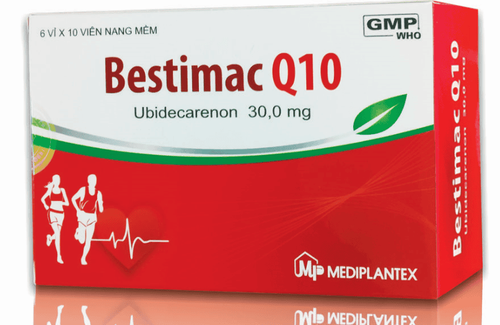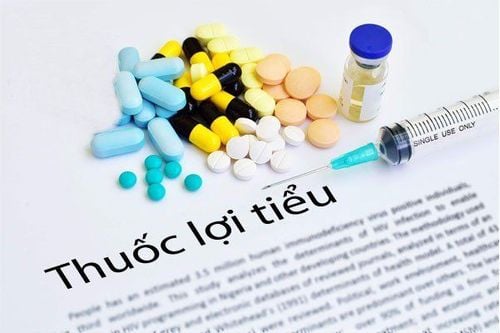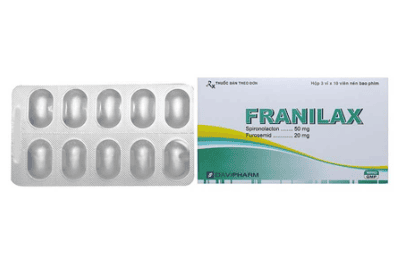This is an automatically translated article.
Uloviz contains the main active ingredient, Furosemide. In patients with heart failure, liver and kidney disease, there is often an excess of water stored in the body, causing edema. At that time, Furosemide is often prescribed as a diuretic, eliminating water and salt for patients, reducing edema.
1. What is the use of Uloviz?
Uloviz drug has the main active ingredient is Furosemide 40 mg, belongs to the group of loop diuretics. Furosemide works by preventing the body from absorbing too much salt, thereby allowing salt to pass through the urine. Uloviz is commonly used to treat fluid retention and edema in people with congestive heart failure, liver or kidney disease, or high blood pressure.
Furosemide belongs to the group of sulfonamide-derivative diuretics, with strong, rapid and dose-dependent effects. Furosemide acts at the ascending arm of the loop of Henle, so it is classified as a loop diuretic. The main mechanism of action of Furosemide is to inhibit the co-transport system of electrolytes Na +, K +, 2Cl- in the thick segment of the ascending loop of Henle, helping to increase the elimination of these substances along with increasing water excretion. At the same time, Furosemide also increases the excretion of Ca2+ and Mg2+. The drug has a strong diuretic effect, which leads to a hypotensive effect, but is usually weak. In patients with pulmonary edema, furosemide increases venous volume, thereby reducing left ventricular preload before the diuretic effect becomes apparent.
Uloviz drug is well absorbed orally, the diuretic effect appears quickly (after 30 minutes), reaches the maximum concentration after 1-2 hours and maintains the effect from 4-6 hours. The antihypertensive effect has a longer duration. In patients with severe edema, due to the direct effect of reduced gastrointestinal absorption, bioavailability of the drug may be reduced. Absorption of furosemide may be reduced and absorption may be prolonged by food. 1/3 of the absorbed drug will be eliminated by the kidneys, the rest is excreted in the urine, mainly as unchanged drug, completely eliminated in 24 hours.
Uloviz drug is often indicated in the treatment of:
Acute pulmonary edema, edema caused by heart disease, liver, kidney and other types of edema. Hypertension, especially hypertension caused by congestive heart failure or kidney failure. Increased blood calcium.
2. How to take Uloviz
Uloviz drug is made in the form of tablets, taken orally.
Dosage:
Treatment of edema:
Adults: Take a dose of 20 - 80 mg/time/day in the morning. If the drug does not respond, increase the dose by 20-40 mg / time x 3 - 4 times / day until effective. When the drug is effective, it can be taken 1-2 times a day or given 2-4 days in a row. If symptoms of edema are severe, a dose adjustment up to 600 mg/day may be considered and cautiously adjusted. Children: Use dose 2 mg/kg/time/day. If the drug does not respond, the dose can be increased by 1-2 mg/kg 3 - 4 times/day to a maximum dose of 6 mg/kg. Treatment of hypertension:
Adults: Use dose 20-40 mg/time x 2 times/day. Closely monitor the patient's blood pressure when using Furosemide alone or in combination with other antihypertensive agents. When a dose of 40 mg twice daily does not decrease blood pressure, it is recommended that adding another antihypertensive agent is preferable to increasing the dose of furosemide. The maximum daily dose is 480 mg in divided doses. Children: Start with a dose of 0.5 - 2 mg/kg x 1 - 2 times/day. If necessary, it can be increased to 6 mg/kg/day. Note:
Depending on each subject with different ages and disease conditions, the dose will be indicated differently. Patients should adhere to the correct and complete dosage and dosing schedule for maximum effectiveness and safety.
In case you forget to take a dose of Uloviz, take it as soon as you remember that you have missed a dose. If it is almost time for the next dose, skip the missed dose and take the next dose on schedule. Do not take a double dose to make up for a missed dose to avoid an overdose.
When Uloviz overdose, common symptoms:
Dehydration. Decreased blood volume. Low blood pressure. Electrolyte imbalance, hypoK+ blood, Cl- decreased alkalosis. Treatment of overdose:
Rehydration of fluids and electrolytes. Assess serum electrolyte levels, CO2 levels, and blood pressure regularly. Adequate drainage should always be ensured in patients with obstruction of urinary outflow from the bladder (eg, an enlarged prostate). Hemodialysis is not necessary because it does not increase the elimination of furosemide.
3. Note when using the drug Uloviz
3.1. Contraindications of the drug Uloviz Patients with hypersensitivity to the drug's component, which is furosemide, or to sulfonamide derivatives such as sulfonamides to treat diabetes. Patients with hepatic pre-coma or coma. Patients with anuria or renal failure due to drugs that are toxic to the kidneys or liver. 3.2. Side effects when using Uloviz Undesirable effects mainly occur when using Uloviz at high doses (accounting for 95% of adverse reactions). The most common symptom is electrolyte imbalance (5% of treated patients). This condition occurs mainly in patients with impaired liver function and in patients with renal failure when receiving high doses of furosemide for a long time. In addition, there are some cases of light sensitivity.
Common (ADR > 1/100):
Circulatory: Decreased blood volume in the case of high dose furosemide therapy. Orthostatic hypotension. Metabolism: Decrease in blood K +, decrease in blood Na +, decrease in blood Mg2 +, decrease in blood Ca2 +, increase in blood uric acid, alkalosis due to decreased blood Cl-. Uncommon (1/1000 < ADR < 1/100):
Gastrointestinal: Gastrointestinal disturbances, nausea, vomiting. Rare (ADR < 1/1000):
Blood: Thrombocytopenia, leukopenia, agranulocytosis. Skin: Skin rash, vasculitis, paresthesias (indicating unusual sensations and tactile sensations such as numbness, tingling, tingling, chills, tickling,... on the skin) Metabolism: Increased urinary glucose, increased blood glucose. Hearing: Tinnitus, reversible hearing loss (common with high doses). How to deal with unwanted effects:
Electrolyte imbalance, including symptoms such as headache, low blood pressure and cramps, often occurs when taking Uloviz at high doses and for prolonged periods of time. long. Therefore, it is necessary to regularly check the electrolytes. K+ supplementation or concomitant use of K+-sparing diuretics may be indicated for patients at high risk of developing hypoK+. The use of potent diuretics such as furosemide can cause cerebral ischemia. Therefore, do not use drugs to prevent hypertension in the elderly. 3.3. Drug interactions Some drugs can cause interactions when used with Uloviz:
Other diuretics. Antibiotics (cephalosporins, aminoglycosides, vancomycin): May cause increased nephrotoxicity. Lithium salts: Increases lithium levels, possibly toxic. Cardiac glycosides: Increases drug toxicity due to hypokalemia. Non-steroidal anti-inflammatory drugs. Corticosteroids. Anti-diabetic drugs. Non-depolarizing muscle relaxants. Anticoagulants. Cisplatin: Increased ototoxicity. Antihypertensive drugs. Phenytoin, carbamazepine. Chloral hydrate. Probenecid. Clopromazine, diazepam, clonazepam, halothan, ketamine. 3.4. Some other notes when using the drug Uloviz. Uloviz should be used with caution in patients with prostatic hypertrophy or dysuria, as it may precipitate acute urinary retention. For pregnant women: Furosemide crosses the placental barrier and causes water and electrolyte disturbances for the fetus. In addition, many cases can cause thrombocytopenia in infants. Therefore, in the last 3 months of pregnancy, Uloviz is only used when there is no alternative medicine and only at the lowest dose for a short time. For nursing mothers: Furosemide use during lactation may inhibit lactation. If it is imperative to take Uloviz, breast-feeding should be discontinued. Uloviz drugs and loop diuretics are often used to appoint in cases of edema caused by hypertension, heart failure, liver disease, kidney disease because of its rapid and strong effect. However, the drug can also cause some side effects in the body. Therefore, it is necessary to use the drug exactly as prescribed and directed by the doctor. During the course of taking the drug, if you have any unusual symptoms, you should immediately contact a medical professional for timely support.
Follow Vinmec International General Hospital website to get more health, nutrition and beauty information to protect the health of yourself and your loved ones in your family.
Please dial HOTLINE for more information or register for an appointment HERE. Download MyVinmec app to make appointments faster and to manage your bookings easily.













